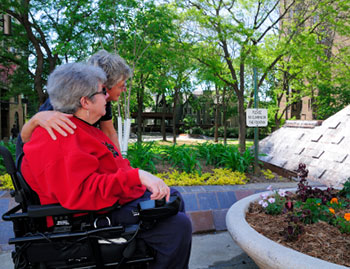
Multiple sclerosis (MS), also known as "disseminated sclerosis" is an inflammatory disease in which the fattymyelin sheaths that surround the axons of the brain and spinal cord are damaged, leading to demyelination and scarring as well as a broad spectrum of painful and debilitating symptoms. In Multiple Sclerosis the body's own immune system begins to attack and destroy myelin. This leads to the axons not being able to send the right message. The name Multiple Sclerosis refers to the scars that form in the nervous system. Multiple Sclerosis affects the ability of the nerve cells in the brain and spinal cord to effectively communicate with each other leading to a variety of neurological symptoms that often progress to physical distress. The cause of Multiple Sclerosis is unknown, although theories include genetics, infections and environmental factors. Those who are afflicted with MS have a life expectancy that is 5 to 10 years lower than that of the unaffected population.
Symptoms
Multiple Sclerosis has a variety of neurological symptoms including; muscle weakness, muscle spasms, problems with coordination and balance, visual impairments, fatigue, chronic pain, changes in sensation and difficulty with bladder and bowel control. Emotional symptoms including depression are also common in dealing with the disease. These symptoms often go through attacks which are acute periods of worse than normal symptoms. These attacks are unpredictable and can occur without warning. Attacks seem to occur more in the spring and summer. Stress and viral infections also increases the likelihood of an attack. Pregnant women have a decreased rate of attacks, but after delivery the risk is increased.
Treatment
There is no current cure for multiple sclerosis, but there are treatments that have been proven to help relieve symptoms. The main aim of therapy is to help reduce attacks, prevent new attacks and further disabilities. Although medical treatments and medications have been proven to be helpful, they also bring with them some adverse side effects.
During acute attacks high doses of intravenous corticosteroids like methylprednisolone are routinely used. Although this treatment may relieve symptoms in the short term, it does not appear to have a significant impact on one’s long term recovery from multiple sclerosis. Many of the treatments for multiple sclerosis are expensive and require frequent use, sometimes even daily. The treatment used for MS are usually disease-modifying which intend to reduce the progression rate of the disease. As one’s multiple sclerosis progresses the symptoms tend to get worse as well. Since there are such a wide variety of symptoms with multiple sclerosis combinations of medications can be used, some may tend to exacerbate certain symptoms while relieving the patients of others.
Rehabilitation programs and physiotherapy can also be proven effective, but it depends on the patient's comfort level as well as current mobility. Since people with MS are temperature sensitive so measures should be taken in order to ensure that the patient does not overheat. Water therapy has been proven to be a very safe exercise program because the cooling of the water can allow for greater degree of exercise.
Patients can also use complementary and alternative medicine in order to help alleviate some of their symptoms. Although the evidence is weak that these treatments are effective many patients feel relief of some symptoms. These treatments include dietary, herbal and self-injection of hookworm.